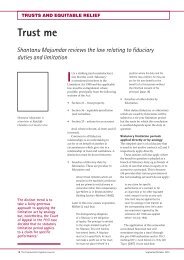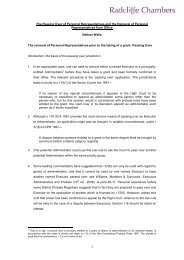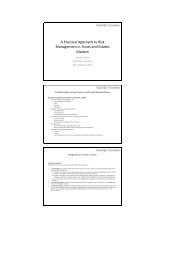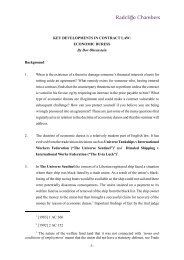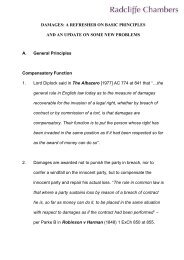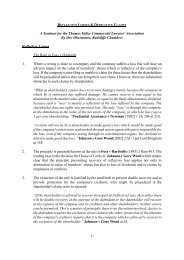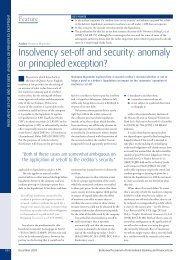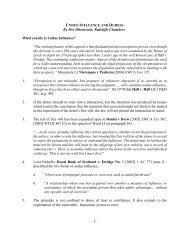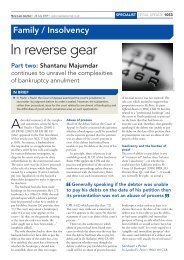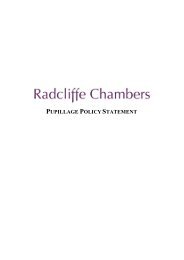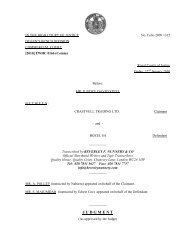Minority Shareholders and Unfair Prejudice - Radcliffe Chambers
Minority Shareholders and Unfair Prejudice - Radcliffe Chambers
Minority Shareholders and Unfair Prejudice - Radcliffe Chambers
Create successful ePaper yourself
Turn your PDF publications into a flip-book with our unique Google optimized e-Paper software.
should not expect the court to take a less vigorous approach to the question of whether<br />
or not a derivative claim is appropriate.<br />
44. In a case where a derivative action had been brought, a shareholder was given leave to<br />
join an unfair prejudice petition to the derivative action but the derivative action was then<br />
stayed in favour of the petition since this enabled all the proceedings between the parties<br />
to be decided at a single trial. 40 Such an approach is convenient where the petition is<br />
based in part on allegations of breach of duty on the part of the majority <strong>and</strong> in part on<br />
allegations of mere unfairness.<br />
PRACTICE AND PROCEDURE<br />
45. Relief under s.994 requires a petition otherwise it will be struck out. Failure to proceed<br />
by petition is not a defect in procedure that can be remedied under the CPR. 41<br />
46. The company will often be named as a respondent alongside the majority shareholder.<br />
This is essential if some remedy is required against it such as a purchase of shares by the<br />
company or the sale of a company asset. It may also be necessary to join all the other<br />
shareholders.<br />
47. It is not necessarily appropriate for the majority shareholder to be represented by the same<br />
solicitors as the company.<br />
48. No limitation period applies to s.994 petitions but the court is likely to refuse to grant<br />
relief if there is excessive delay. 42<br />
49. In appropriate cases, summary judgment or a strike-out may be available. Within this<br />
category would be cases where a detailed shareholder agreement includes an entire<br />
agreement clause negating any contrary underst<strong>and</strong>ing, or there is a relevant arbitration<br />
clause or other dispute resolution mechanism.<br />
50. Section 122(1)(g) of the Insolvency Act 1986 provides the drastic remedy of winding up<br />
a company on just <strong>and</strong> equitable grounds. A winding up petition should not be issued in<br />
conjunction with a s.994 petition unless the petitioner has a genuine intention to seek the<br />
winding up of the company. If unfair prejudice under s.994 cannot be established then<br />
just <strong>and</strong> equitable winding up will not be available either. 43 Note that a just <strong>and</strong> equitable<br />
winding up petition engages s.127 of the Insolvency Act 1986 (restriction on post petition<br />
dispositions by the company).<br />
40<br />
Cooke v Cooke [1997] 2 BCLC 28<br />
41<br />
Bamber v Eaton [2007 BCC 272<br />
42<br />
Re Gr<strong>and</strong>actual [2006] BCC 73, where relief was refused in respect of events 9 years<br />
before<br />
43<br />
Re Guidezone [2001] BCC 692<br />
-10-



